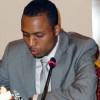Regional consultation on Regional Agenda for Accelerating Universal Access to Sexual and Reproductive Health convened in Addis Ababa
Addis Ababa, 24-28, September -- The 5 -day Regional consultation on Regional Agenda for Accelerating Universal Access to Sexual and Reproductive Health involving participants from 28 African countries kicked off on the 24th of September 2012.
The objectives of the meeting are to introduce the “Regional Agenda” designed to guide countries to ensure universal access to proven effective and quality Sexual and Reproductive Health (SRH) services using the most effective and appropriate delivery system, to promote interactive discussions and sharing of experiences for its implementation, to develop country actions plans for implementation, and to build partnership in support of the implementation of the Regional Agenda.
The meeting was opened in the presence of Mr. Sintayehu Abebe, Representing the Federal Ministry of Health; Dr. Tigest Ketsela, Director, Health Promotion Cluster, WHO African Region (AFRO); and Dr. Khaled Bessaoud, Acting WHO Representative to Ethiopia.
Following his warmly welcoming address, Dr. Khaled Bessaoud, emphasized the slow progress the African Region is making in the attainment of indicators for Universal Access to Reproductive Health: Ante natal care at least 4 visits stands at 43%, Contraceptive Prevalence Rate (CPR) estimated at 24% with unmet need of family planning of 25%.
Adolescent birth rate is equally high at 117 per 1000. Highlighting the importance of the implementation of the Regional Agenda in Accelerating Universal Access to Sexual and Reproductive Health, he called for stronger partnership with the involvement of sectors of Finance, Education, Civil Society, Non-Governmental Organizations, Academia, Professional Associations, Women’s Rights Group’s Association and Community Leaders to speed up the implementation of the Regional Agenda.
Dr. Khaled noted also the need for strong political commitment and ownership for rapid scale up and sustainability of interventions towards Universal Access to Sexual and Reproductive Health. Recognizing the achievements made by the Government of Ethiopia in the reduction of infant mortality, under –five mortality and doubling of the CPR, he reiterated on WCO’s continued support. He said, “The WHO in Ethiopia is witness to and is fully engaged in supporting the Government’s efforts to address SRH agenda with its sister UN agencies through the UNH4+ joint program on MNH.
Dr. Tigest Ketsela, who delivered key note address on behalf of Dr. Luis Gomes Sambo, the Regional Director of the WHO AFRO, emphasized that the health of women and children in the African Region had remained an unresolved challenge for some decades. She said, “With only 3 years remaining to achieving the Millennium Development Goals (MDGs), the African Region has registered the slowest progress in the reduction of maternal, newborn and child mortality to the other WHO Regions.”
In a move to address the challenges observed in the slow progress in Maternal health and in the reduction of under –five Mortality, despite there is some progress, Dr. Tigest said, “In order to overcome the challenges and stimulate progress, WHO in collaboration with partners and with the financial support from Lucile and David Packard Foundation, embarked in the progress of developing a Regional Agenda to accelerate the attainment of Universal Access to Reproductive Health. Speaking on the purpose of the Regional Agenda, she pointed out that it will provide an opportunity for Member States and Partners to examine the way we have been doing business and reinvigorate our approaches for accelerating progress.
The proposed actions will also enhance the implementation of the commitment of WHO, Partners and Countries have made through the international and regional resolutions including the Road map to accelerate the reduction of Maternal, Newborn Mortality the repositioning of Family Planning and the Global Strategy on Reproductive Health, to mention a few.”
In his opening remark, Mr Sinetayehu Abebe, acknowledged the slow progress on MDG 5 and reiterated the commitment of his Government. He said, “We are pleased with the progress being made by our own country, and many others in Africa, on MDGs and we recommit ourselves to reinforce action on MDGs where progress has been slow. Progress has been particularly slow on MDG5, which focuses on improving safe motherhood and ensuring universal access to SRH services.”
On the expectation of the workshop, Mr Sinteyaehu underscored, “The topic that brought us together today, the Regional agenda for Accelerating Universal Access to Sexual and Reproductive Health Services in the African Region, will be an important tool to boost our efforts and guide countries to ensure Universal Access to proven effective and quality Sexual and Reproductive Health services using the most effective and appropriate delivery system. I believe, this consultation will be contributing to the further enrichment of the Agenda and prioritize focus of interventions by taking lessons from each other.”
The meeting which brings together stakeholders involved in SRH issues in the African Region is being attended by SRH programme managers experts and Directors of Preventive Health Services drawn Ministries of Health, UN and other International and National non-governmental Agencies.





